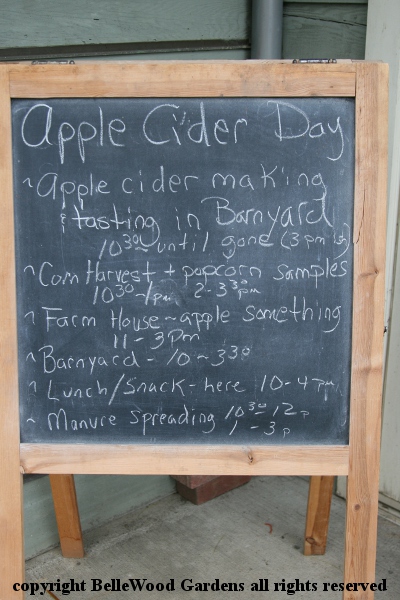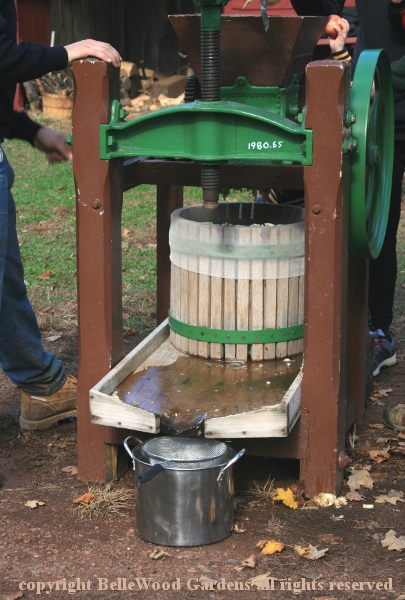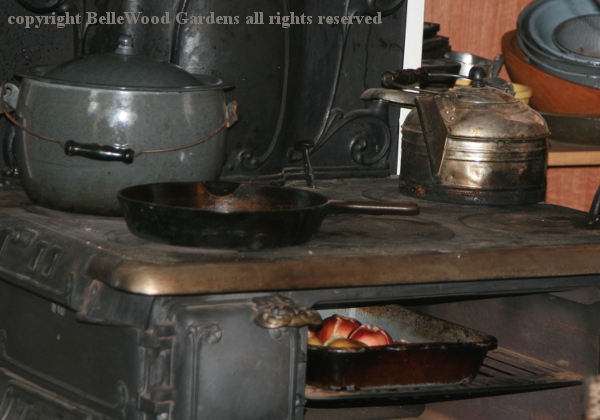
.
If you have any comments, observations, or questions about what you read here, remember you can always Contact Me
All content included on this site such as text, graphics and images is protected by U.S and international copyright law.
The compilation of all content on this site is the exclusive property of the site copyright holder.
Apple Day at Howell Living History Farm
Saturday, 3 November 2018
Yesterday it rained and rained some more and kept on raining, a couple of inches worth. The front came through, the skies cleared, and today is sunny with big white puffy clouds and strong gusty wind. A fortuitous change in the weather for today's apple event at Howell Living History Farm in Mercer County.

Here's a list of today's events - making apple cider and
in the barnyard, apple something in the farmhouse kitchen.

There's a huge bin of apples in the barnyard. People are asked to
wash their hands before bringing apples over to the cider press.

I'm sure she could have carried more than two . . .

Apples go into the hopper. The big green wheel gets cranked around to crush the apples. The pulp falls into the filter-lined barrel. Once filled, the barrel is moved to the forward position and an empty barrel replaces it. A thick wooden plate goes over the folded down filter bag to cover the crushed apples. Next, two thick wooden blocks fit on top of the disc. A screw feeds through the center hole of the blocks and plate, then applies force as the horizontal wheel is tightened.

To squeeze every last bit of juice out of the pulp, a cheater, a thick dowel,
is used to apply even more pressure than can be managed by hand.

And the fresh, raw, cider is flowing through a strainer into a pot.
Apple cider is delicious to drink. It may also become something else. If cider begins to ferment it turns into somewhat alcoholic "hard" cider, very popular in the UK . In the USA it may be found in bottles, available where beer is sold. In olden days if a farmer had a barrel of hard cider it could be left outdoors, to freeze. That is, the water freezes but the alcohol (which has a lower freezing point) does not. Freeze distillation produces apple jack, more alcoholic than hard cider.
Nor should we forget apple cider vinegar. It is wonderful stuff used for making
pickles, salad dressing, and assorted health benefits both external and internal.
Commercial cider is pasteurized. This is not. Apple juice is filtered
even more, to reduce the littlest bits of pulp for a clear product.

And the pomace that remains is fed to the pigs. They really like it.

Children, especially, like using this mechanical apple peeler.
They turn the crank, and long ribbons of peel come coiling off.
The child gets to eat the peeled apple, chickens get the peel.

In the farmhouse kitchen Kim is stirring a pot of apple sauce,
gently simmering on one lid of the six lid 1904 Glenwood stove.

Kim sprinkles on some cinnamon sugar to finish the applesauce
before dishing up small samples to pass out to the eager audience.

She checks on a pan of baked apples in the oven and decides they're done.

Just a simple recipe she tells us: core out the center of each apple. Add a small piece of bread as a stopper at the bottom. Fill with whatever catches your fancy - raisins, maybe walnuts, perhaps both. Add some cinnamon sugar and a little butter. Then bake. Looks tempting and smell delicious! They're a treat for the farmhands, a program for young volunteers who collect eggs, feed the pigs and sheep, help with other farm chores.
Back to Top
Back to November 2018
Back to the main Diary Page